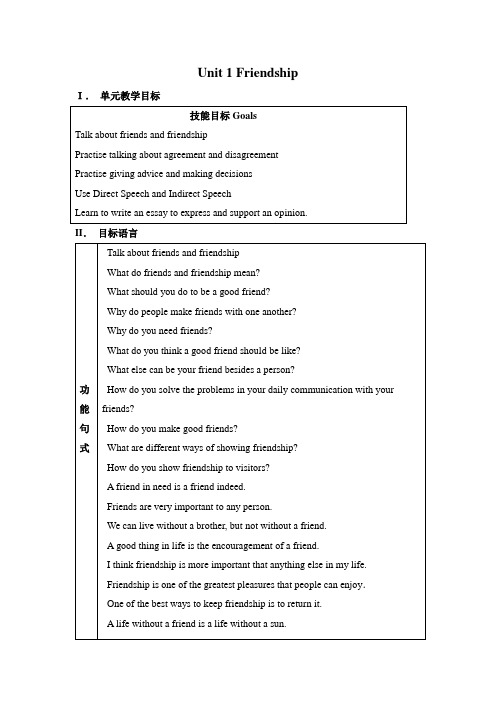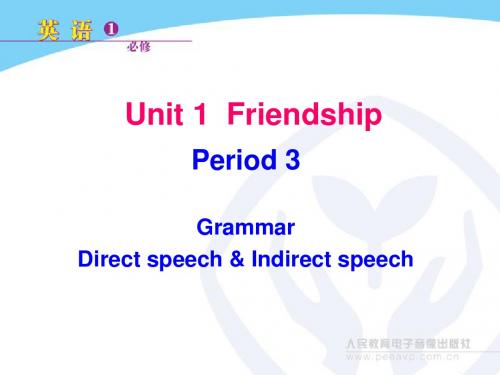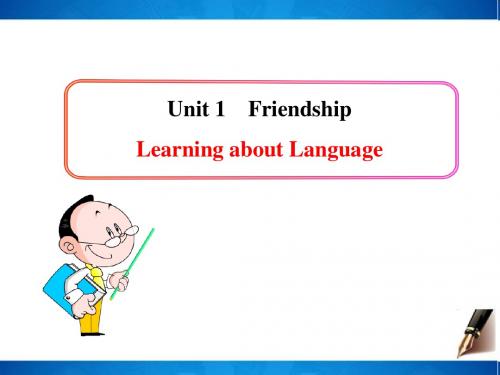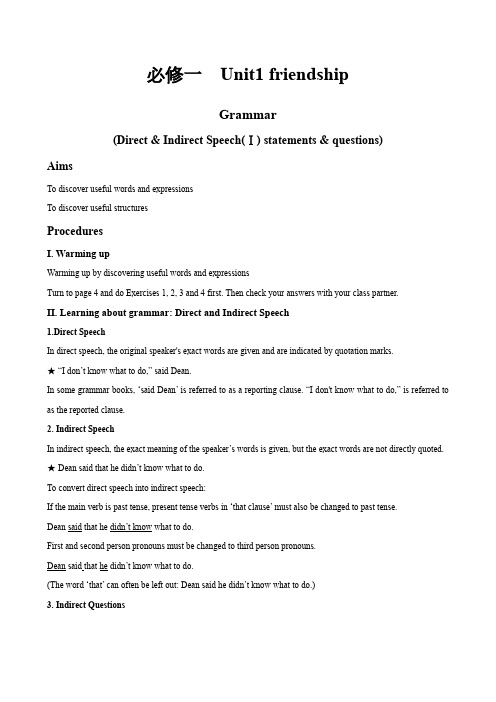Unit 1 Friendship Direct Speech and Indirect Speech
人教版高中英语必修一教案Unit 1 Friendship (含答案)

Unit 1 Friendship I.单元教学目标II.目标语言III. 教材分析和教材重组1. 教材分析本单元以Friend和Friendship为话题,旨在通过单元教学使学生通过讨论什么是好朋友,什么是真正的友谊,如何交友和保持友谊等问题,使学生树立正确的交友观。
并针对日常交友过程中经常遇到的实际问题,指导学生发表自己的见解和看法,通过进一步讨论提供有效的解决方案。
并能就此以编辑的身份写出指导信,对相关谚语写出观点明确、论证有力的短文。
1.1 Warming Up以调查问卷的形式,通过对学生在日常交友过程中所遇到的五个问题,展开调查,使学生对是否擅长交友做出评价,激发学生对本单元的中心话题产生兴趣;同时也使教师本单元的授课更具有针对性,从而有效地帮助学生树立正确的交友观。
1.2 Pre-Reading通过四个问题引导学生讨论交友的重要性以及自己心目中好朋友的概念和标准,并使学生认识到不仅人与人,人与物(如日记)也可以成为好朋友。
继续探究并树立正确交友观,并为阅读作好了准备。
1.3 Reading讲述第二次世界大战的纳粹统治时期,犹太人Anne一家过着滇沛流漓,与世隔绝的生活。
Anne在孤独中只能以日记Kitty 为友,倾诉衷肠,伴其渡过两年的逃亡生涯。
控诉了纳粹党的残暴统治给犹太人民带来了深重的灾难,并以日记的形式表达了以主人公Anne为代表的全世界人民憎恨战争渴望和平的共同心愿。
学生学习了新的词汇、句型,提高了阅读水平。
文中选用了主人公的一篇日记,使学生进一步感受到了挚友的可贵,对主人公内心世界的描写有了更深刻的理解。
1.4 Comprehension 设计了三种题型。
其中前两个是考查学生对READING文章细节内容的理解,最后一题是开放性问题,学生可以在更深入理解主人公内心世界的基础上各抒己见,使学生养成勤于思考勇于探究的良好的学习习惯,现时也培养了学生的想象力,进一步提高了阅读水平。
内蒙古乌拉特中旗一中高一英语导学案《Unit1 Friendship》 Period 4(新人教版必修1)

(导语及教学流程步骤,学法指导)
教学反思
二.自主学习:
Students’book page5 --- 1.观察并总结:由直接引语变间接引语
1.引导词:1)直接引语是陈述句时加引导词;
2)直接引语是一般疑问句时加引导词;
3)直接引语是特殊疑问句时;
2.时态:
3.语序:
三.巩固练习:SB page5----2
四.合作探究:SB page5----3学生合作完成并表演这段对话
3. Learn the rules of turning the indirect speech into direct speech
(复制学生用导学案内容)
学习目标:Direct speech and Indirect speech;
重点、难点:1. Learn what is direct speech and indirect speech.
2. Learn the rules of turning the direct speech into indirect speech;
3. Learn the rules of turning the indirect speech into direct speech
学习过程:
一.课前预习:turn the following into questions:
1. Her family was Jewish.
2. She wants the dairy to be her friends.
3. She could tell everything to it.
4. That has changed since I came here.
Unit 1 Friendship Period 3 grammar

Bring
Task 4
Adverbial of time
Direct Speech Now Today Yesterday This week/month/year Last week/month/year Three days ago Tomorrow
Indirect Speech
Task 1 Sentence structure
Practice
4. Her father asked her why she chose/ had chosen her diary and old letters. 5. “Are you very hot with so many clothes on?” Mother asked/said to her. 6. “What else have you hidden under your overcoat?” Margot asked her. 7. “ When shall we go back home?” Anne asked her father. 8. “ Why did you talk so much to that boy?” Father asked Anne.
Then That day The day before/the previous day That week/month/year The week/month/year before Three days before The next/following day
Grammar Study
Try to change direct speech into indirect speech : 1. He said, “the earth goes around the sun.” He said that the earth goes around the sun. 2. He said, “The train leaves at 7:30p.m.” He said that the train leaves at 7:30p.m. 3. He said, “Rome isn’t built in a day.” He said that Rome isn’t built in a day. 4. Tom said, “I was born in July, 1978.” Tom said he was born in July, 1978.
Unit 1 Friendship grammar

Grammar
Direct Speech &
Indirect Speech
lead-in
I am a student.
She said, “I am a student.”
She said (that) she was a student.
Direct Speech (直接引语)
My friend told me that he had two partner in his team.
1、人称的变化一随主,二随宾,第三人称不更新
口
说明
直接引语
诀
间接引语
一
引号内的第一人 称变间引后与主
随 句主语的人称保
主 持一致
She said,“ I like playing tennis.”
1. will would 2. don’t not to 3. was his home his home was 4. bought had bought 5. not not to
直接引语 一般现在时 现在进行时 一般过去时 现在完成时 一般将来时
间接引语 一般过去时 过去进行时 过去完成时 过去完成时 过去将来时
我大
我围着你转
The teacher told “The earth moves us that the earth around the sun.” moves around the
第一 人称
He said, “I haven't heard from my parents these days.”
He said that he hadn't heard from his parents those days.
unit1Friendship Direct speech and indirect speech

Task 2 .完成下列直接引语与间接引语的转换 (每空一词)。
1. Peter asked, “Have you found what’s wrong with the computer or not?’ Peter asked me w__h_e_th__e_r I had found what __w_a_s__wrong with the computer or not.
2. “Where's your sister?” she asked. →She asked me _w__h_er_e_my sister was.
特殊疑问句变为: 由原来的疑问词引导的宾语从句。
complete the sentences and do some summary.
1. “Is anyone late for class? she asked. →She asked __if_/_w_h_e_t_h_e_r__ someone was late for class.
从句要用陈述语气,构成:whether+___主__语__+_谓__语______ 3. 直接引语为特殊疑问句时,变成间接引语应改为______由__原__来___疑__问__词__引__导___的__宾__语__从___句__。__
从句要用陈述语气,构成 :特殊疑问词+____主__语__+_谓__语_____
引语前常使用逗号而非冒 号;引号内直接引语的单 词首字母要大写。
Lily asked me , “Ha 间接引语(indirect speech): 用自己的语言来转述别人说 的话,被转述的部分就叫间接引语。
Mother asked me what I was doing.
2012高考英语人教版必修1Unit1《Friendship》知识与要点

(2)concerned adj.关心的,挂念的;有关 的(用作此义时,不用于名词前)
as/so far as...be concerned就……而言,关 于,至于
be concerned with/in与……有关的,涉及 到
(3)feel/show concern about/for...担心,挂 念……
hot with so many clothes on.
1.upset adj.心烦意乱的;不适的;不舒 服的
vt.(upsetting—upset—upset)使苦恼,使不安; 搅乱,打乱;使肠胃不适;弄翻;打翻
归纳拓展 (1)be upset about/over/at sth.为某事烦心 (2)(sth.)upset sb.(某事)使某人心烦意乱
________ the manager of that company.A new
car factory will soon be set up.
A.has been made;to signed;with
B . has been
重点 句型
able to be outdoors for so long that I've grown so
crazy about everything to do with nature. 3.It was the first time in a year and a half
that I'd seen the night face to face. 4.Mother asked her if/whether she was very
②The new plant cannot ________ the cold weather,so the researchers are trying to deal
UnitoneFriendship

UnitoneFriendship unit one friendshipdirect speech and indirect speech(直接引语和间接引语)一.基本概念i直接引语变为间接引语1)、直接引语为陈述句2)、直接引语为祈使句3)、直接引语为疑问句4)、直接引语为感叹句ii1、直接引语和间接引语都属于宾语从句2、直接引语和间接引语的概念(1)直接引语:一字不改地引述别人的话(2)间接引语:用说话人自己的话转述别人的话二.变换类型1.直接引语为陈述句直接引语为陈述句,用that引导(口语中可以省略)。
引述动词有:say, tell等。
陈述句变间接引语要注意:1、人称的变化2、指示代词、时间状语、地点状语和动词的变化3、时态的变化4、人称的变化。
一般的规则:一随主,二随宾,三不变例如:the teacher said, “john, you must bring your book to the class. ”1> 第三者说:the teacher told john that he must bring his book to the class.2> 别人对约翰说:the teacher said that you must bring your book to the class.3> 约翰自己说:the teacher said that i must bring my book to the class. i指示代词、时间状语、地点状语和动词的变化1〉指示代词的变化this---- that these----those2〉时间状语的变化now----then ago----before today----that day yesterday----the day before; the previous day tomorrow----the next day; the following day the day before yesterday----two days before the day after tomorrow----twodays later next week/month, etc.----the next week/month, etc. last week/month, etc.---- the week/month before3〉地点状语的变化here----there4〉动词的变化come----go注:在当地转述时,here不变为there,come不变为go.在当天转述时,yesterday, tomorrow等时间状语也不变。
unit-1-direct-speech-and-inderect-speech

4. 直接引语是祈使句,变成间接引语时,把动词原形变成 动词不定式,并在动词不定式前加tell, ask, order 等的宾 语。例如:
The captain ordered, "Be quiet."→ The captain ordered us to be quiet.
注意:此种情况的否定句,在动词不定式前ng Hua whether he was leaving for Shanghai or Nanjing .
(10)I asked my brother,”Shall we go to the Summer Palace next week?” I asked my brother if we would go to the Summer . Palace the next week
Future tense
Past future tense
直接引语和间接引语正误例析 1. “Where does your chemistry teacher live,Karen?” the young man asked. a.The young man asked Karen where did her chemistry teacher live. (误 ) b.The young man asked Karen where her chemistry teacher lived. (正 ) 简析:一般说来,直接引语是疑问句,将其变为间接引语时,原 来的疑问语序要改为陈述语序。
(8)“Was Wang Fei here yesterday,Zhang Ming?”Wu Ming asked.
Wu Ming asked Zhang Ming whether Wang Fei had been there the day before. (9)”Xiao Yu said ,”Are you leaving for Shanghai or Nanjing,Zhang Hua?”
Unit 1《Friendship》Learning about Language

Grammar Direct Speech and Indirect Speech(Ⅰ)
引述别人的话语一般采用两种方式:
一是直接引用别人的原话 ,把它放在引号内 ,这叫
直接引语(Direct speech); 一是用自己的话加以转述, 这叫间接引语 (Indirect speech)。
时间状语的变化
直接引语 间接引语
now
today tonight three days ago
then that day
that night
this week/month
yesterday tomorrow
three days before that week/month the day before the next/following day the week/year before the next week/ year
由直接引语变为间接引语需注意的四个变化 人称变化
时态变化
状语变化(时间状语和地点状语) 句型变化(陈述句、一般疑问句、特殊疑问句)
The boss told me ,“I have bought an expensive car ”. The boss told me he had bought an expensive car. I often tell him , "You are the luckiest boy I have ever seen . " → I often tell him he is the luckiest boy I have ever seen .
时态
直接引语变为间接引语引述动词如果用的是过去 式,间接去时 一般将来时 现在进行时 现在完成时 过去完成时 过去进行时 can may must 祈使句
人教版高中英语必修一 教案: Unit1Friendship Grammar4

必修一Unit1 friendshipGrammar(Direct & Indirect Speech(Ⅰ) statements & questions)AimsTo discover useful words and expressionsTo discover useful structuresProceduresI. Warming upWarming up by discovering useful words and expressionsTurn to page 4 and do Exercises 1, 2, 3 and 4 first. Then check your answers with your class partner.II. Learning about grammar: Direct and Indirect Speech1.Direct SpeechIn direct speech, the original speaker's exact words are given and are indicated by quotation marks.★“I don’t know what to do,” said Dean.In some grammar books, ‘said Dean’ is referred to as a reporting clause. “I don't know what to do,” is referred to as the reported clause.2. Indirect SpeechIn indirect speech, the exact meaning of the speaker’s wo rds is given, but the exact words are not directly quoted. ★Dean said that he didn’t know what to do.To convert direct speech into indirect speech:If the main verb is past tense, present tense verbs in ‘that clause’ must also be changed to past ten se.Dean said that he didn’t know what to do.First and second person pronouns must be changed to third person pronouns.Dean said that he didn’t know what to do.(The word ‘that’ can often be left out: Dean said he didn’t know what to do.)3. Indirect QuestionsThe same rules apply to indirect questions as to indirect statements. The difference is that a wh- clause is used instead of a that clause.In telling a story or recounting events, a speaker using direct speech has all the resources of intonation to produce a lively account. Because indirect speech is always speech reported by someone else, the account is more reserved and restrained.The ability to change direct speech into indirect speech is a useful skill for those engaged in taking the minutes of a meeting or reporting on events.III. Discovering words and expressionsDo exercises 1, 2, 3 and 4 on page 4 and 5. Check your work with your partner’s.IV. Discovering structuresDo exercise 1 and 2. Check your work with your partner’s.。
高中英语:Unit 1 Friendship Direct Speech and Indirect Speech

Step 2: Learn the definition.
Sun Yang said: “ I will defeat you next time.”
a.直接引述别人的原话,叫 “直接引语”。 (有引号)
Sun Yang said that he would defeat him next time.
55..SShheessaaiiddt:h“aIt’lslhceomwoeuhledrgeototmheorrertohwe.next day.
Task 4: Translate the sentences.
1➢. H他e说s他aid已h经e爱ha上d廉fa江lle了n。in love with Lianjiang. 2➢. O我u们r的G地eo理gr老ap师h告y t诉ea我ch们er地t球old围u着s 太th阳e e转ar。th moves
Xiao Qian said:"I was born on April 20, 1980."
Xiao Qian said she was born on April 20, 1980.
(3) 如果直接引语中的情态动词没有过去时的形式(例: ought to, had better, used to)和已经是过去时的形式时, (例:could, should, would, might)不再变。
现在完成时
过去完成时
Amy said:“I’ve not heard from Jordan since May.”
Amy said that she __h_a_d__ not heard from Jordan since May.
一般过去时
过去完成时
They said:“We saw her in the street.” They said that they _h_a_d__ seen her in the street.
高一英语Unit 1 Friendship Period 4 Grammar Direct and Indirect Speech导学案设计

Unit 1 FriendshipPeriod 4 Grammar: Direct and Indirect Speech主备人:赵金秀审核人:高一英语组使用时间:2014年9月一学习目标:1. 掌握直接引语和间接引语之间的转换。
2. 提高学生在不同情景中运用直接引语和间接引语的能力。
3.了解并掌握宾语从句。
二学习内容:Part 1 预习自测判断下面几组句子中,哪一句是直接引语?哪一句是间接引语?他们的区别是什么?(见课本第5页)Part 2 Summary (归纳总结)Step 1 知识网络1 重点:______________________________叫做直接引语;__________________________叫做间接引语。
直接引语为陈述句、一般疑问句、特殊疑问句和祈使句时,转换为间接引语时, 在句子的___________、_____________、____________、______________和__________等方面都有变化。
(见课本第87页)2. 难点:谓语动词时态变化需要注意几点:1). 直接引语表述的是客观真理,变为间接引语时,时态不变The geography teacher said, ―The sun rises in the east and sets in the west.------The geography teacher told us that the sun rises in the east and sets in the west. 2).主句谓语动词的时态是现在时态,在引述时,时态不变。
She says, ―I’ll never forget the days in the country.‖-----She says that she’ll never forget the days in the country.Part 3 Further study(深入探究) 句式的变化A 转述他人的陈述→陈述句He said , ―I’m going to Beijing.‖→He said that he was going to Beijing.陈述句句型总结____________________________________B 转述他人的疑问→一般疑问句He asked, ―Are you a teacher?‖→He asked me if /whether I was a doctor.一般疑问句句式总结:____________________________________C 转述他人的问题→特殊疑问句She asked, ―What are you doing?‖→She asked me what I was doing.特殊疑问句句式总结:_______________________________________小练习①He said, ―I have been to the Great Wall.__________________________________________________________②He said, ―I'll give you an examination next Monday.___________________________________________________________③He said, ―Do you have any difficulty with pronunciation?___________________________________________________________④He said to me, ―What's your name?____________________________________________________⑤He asked us, ―How many car factories have been built in your country? ___________________________________________________________Part 4 Exercises (当堂检测)( )1. Tom asked Jack ______________ .A why he was so excited B. why was he so excited C. why is he so excited D. why he is so excited ( )2. ―Have you seen the film?‖he asked me. →He asked me _______.A. had I seen the filmB. have I seen the filmC. if I have seen the filmD. whether I had seen the filmA. when will he go fishingB. when he go fishingC. when he will go fishingD. when does he go fishing( )4. ―I am a teacher, ‖Jack said. →He said _________.A. that I am a teacherB. I was a teacherC. that he is a teacherD. he was a teacher( )5. He said, ―Mother, the boy is very naughty.→He _____very naughty.A. said his mother that the boy wasB. said to his mother that the boy isC. told his mother that the boy wasD. spoke to his mother that the boy is ( )6. ―You’ve already got well, haven’t you?she asked. →She asked ________.A. if I have already got well, hadn’t youB. whether I had already got wellC. have I already got wellD. had I already got well.( )7. He asked , ―Are you a Party member or a League member?‖→He asked me _________.A. am I a Party member or a League memberB. was I a Party member or a League memberC. if I was a Party member or a League memberD. whether was I a Party member or a League member.( )8. He asked, ―How are you getting along?→He asked _______.A. how am I getting alongB. how are you getting alongC. how I was getting alongD. how was I getting along( )9. He asked me ________ with me.A. what the matter isB. what the matter wasC. what’s the matterD. what was the matter( )10. Bob said _________________.A. I will never forget my visit to Yanan.B. I would never forget my visit to Yanan.C. he will never forget his visit to Yanan.D. he would never forget his visit to Yanan. 三学法指导:本单元语法教学内容是直接引语变间接引语。
河南省人教版高中英语教材基本框架(M1-M9)

directions
Word formation
Unit1
Great sientists
How to organize Talking about scientific research scientific jobs
The Past Participle(1) as the Attribute and
Unit5
The qualities of Nelson great person Mandela-a modern
hero The lives of some great people
Asking opinions
Giving opinions
The Attributive Clause2(wher e,when,why,p rep.+which/w hom)
Unit1
Great sientists
Contributions of scientists
The Past
Participle(1)
Describing as the
people(appeara Attribute and
nce,
Predicative
charactersitics
and qualities)
communication
Prohibition and warning Obligation
The -ing form as the Attribute and Adverbial
Unit5
Asking the way
Theme parks
Different types of
theme park
Giving
gravity
高中英语 Unit 1 Friendship grammar direct课件 新人教版必修1

第十五页,共27页。
由直接引语转变为间接引语,下 列情况(qíngkuàng)时态不变:
1. 不变的真理(zhēnlǐ)
The teacher said to the
students, “Water freezes
when the temperature falls below 0℃.”
condition of the soil.
asked
is
was
They asked him if it was easy to
improve the condition of the soil.
第十二页,共27页。
3.特殊(tèshū)疑问句: When do you harvest the wheat ? ( They asked him )
here
come bring
第十页,共27页。
间接引语
that
those
Then
That day
That night That week The day before The week before Three days before
The next day
The next week
there
go
take
what people say. (e.g. phone message)
• Direct Speech: Say exactly what someone said. ("...”; word for word)
• Indirect Speech: Retell what the person said (no"...”; no “word for word”; changes)
高中人教版英语必修一课件:unit 1 friendship section c grammar1

不定式 The officer ordered him not to leave his post.
直接引语 (变化前) 间接引语(变化后)
Let’s开头的祈使句 that 引导的宾语从句
I said to him,
I suggested to him
“Let’s start at
that we (should) start
4. 部分情态动词, 如must, ought to, used to, had better等: She said to me, “You must hurry up.” → She said that I must hurry up.
1. 转述他人的陈述→陈述句 He said, “I’m going to Beijing.” → He said that he was going to Beijing.
once.”
at once.
感叹句 He said: “How happy I am!”
that / what / how 引导的宾语从句
He said that he was very happy. He said how happy he was.
由直接引语转变为间接引语, 有时会引起 时态的变化, 注意以下几个方面。
“I read the book here a week ago,” Jane said to him. Jane told him that she had read the book there a week before.
Direct speech now today tomorrow
yesterday
2. 转述他人的疑问→一般疑问句 He asked, “Are you a teacher?” → He asked me if /whether I was a teacher.
- 1、下载文档前请自行甄别文档内容的完整性,平台不提供额外的编辑、内容补充、找答案等附加服务。
- 2、"仅部分预览"的文档,不可在线预览部分如存在完整性等问题,可反馈申请退款(可完整预览的文档不适用该条件!)。
- 3、如文档侵犯您的权益,请联系客服反馈,我们会尽快为您处理(人工客服工作时间:9:00-18:30)。
直接引语和间接引语 4.疑问句 疑问句 5.祈使句 祈使句
Unit One
" Can you keep quiet, please? "
The old man asked us whether we could keep quiet.
直接引语和间接引语 I know !
Unit One
1) 直接引语是非特殊疑问句(一般疑问句, 直接引语是非特殊疑问句(一般疑问句, 选择疑问句、反意疑问句) 选择疑问句、反意疑问句)时间接引语用 whether/if 引导 用陈述语序,并且 引导, 用陈述语序,并且said 要改 变成asked. 变成 a). He said, “are you interested in English?” He asked (me) if I was interested in English. b). I asked him, “will you stay at home or go to a movie tonight?”
Anne
直接引语和间接引语
Unit One
Does a friend always have to be a person?
The writer asks us if a friend always has to be a person.
the writer
直接引语和间接引语
Unit One
What do you call your diary, dear sister?
直接引语和间接引语
Unit One
直接引语和间接引语
Unit One
I don’t want to set down a series of facts in a diary.
Anne said that she didn’t want to set down a series of facts in a diary.
Where did you lose it?
He asked her where she had lost it.
If we report his question, we say… …
直接引语和间接引语
I know!
Unit One
2) 直接引语为特殊疑问句时,间接 直接引语为特殊疑问句时, 引语用原句中的特殊疑问词引导, 引语用原句中的特殊疑问词引导 疑 问部分用陈述语序,句末用句号,改 问部分用陈述语序,句末用句号 改 为陈述语序。 为陈述语序。 He asked me , “what is your name?” He asked me what my name was. He asked, “where are you going, Peter?” He asked Peter where he was going.
2. 时态的变化 Now let’s enjoy a flash movie. 结论: 结论:转述词为过去时态 He said he… 时,引语时态前推一格。 引语时态前推一格。 plays 现在时 played football 一般现在时 一般过去时 一般 football 一般过去时 is playing 现在进行时 has played 现在完成时 played 过去时 will play 一般将来时 had played 过去完成时 was playing 过去进行时 had played 过去完成时 had played 过去完成时 would play 过去将来时 had played 一般现在时 一般现在时
直接引语和间接引语
Unit One
直接引语和间接引语
Unit One
a competition
300分 分
200分 分
150分 分
100分 分
直接引语和间接引语
时态不变化
Unit One
(1)直接引语是客观真理 直接引语是客观真理 (5). 若直接引语的谓语中含有would, 若直接引语的谓语中含有 (4). 若直接引语中含有 若直接引语中含有when, since,
直接引语和间接引语 4.疑问句 疑问句
Unit One
At the palace ball, Pierre asked Mathilde… …
Are you pleased?
He asked her if she was pleased.
If we report his question, we say… …
Unit One
She said she was glad to help you.
Wha t?
I am very happy to help you.
直接引语和间接引语
Unit One
The shoes are too big for me. .
What did he say?
He said the shoes were too big for him.
Where are the goats?!
I’m here! The Big Red Wolf asked the Big Big Wolf where the goats were.
直接引语和间接引语
Unit One
At the palace gate, the guards asked Mathilde… …
I asked him whether he would stay at home or go to a movie that night.
直接引语为选择疑问句, 直接引语为选择疑问句,间接引语用只能用 whether …or…引导。 引导。 引导
直接引语和间接引语 5.祈使句 祈使句
Unit One
“The earthsaid, “We should the sun and moves around Shesaid, “I went therehelp each other.” She when I was six the moon 2l, 1980.” moves the earth”, April boy saidaround I usually get the The She said to us, “ → old.” we should years teacher told me.help each other. →Xiao six every day.”was born he up at Wang saidhad gone there when → The → She said she the earth moves teacher told me on April 21, 1980. the moon moves aroundThe boy told us old. she was six and → the sun years he usually gets up at around the earth . six every day.
Unit One
地点状语 动词
Help! Waa… bring/take bring come/go,
the next week the day before the night before before there
直接引语和间接引语
Unit One
Exercises 1.The boss told her, “I will leave tomorrow.” The boss told her that he would the next day leave____________ . 2. He said, “I saw her here three days ago.” there three days before . He said that he had seen her____________________
直接引语和间接引语
----- The Big Big Wolf said he wanted to eat She ,有 this that said she 直接引语转变为间接引语时, 指示代词 直接引语转变为间接引语时 he He said that I will be that fatthese goat. was those busy 些指示代词、时间地点壮语、 些指示代词、时间地点壮语、表 would be there here this that then day. now 时 示方向的动词要发生变化。 this that evening. evening I want to eatday that today 间 fatthe next/following day goat!
Anne’s sister
Anne’s diary, Kitty直源自引语和间接引语Unit One
Why did you go to bed so late last night, Anne?
Anne’s Anne s father
直接引语和间接引语
小结
Unit One
1.人称变化 人称变化
定义
Unit One
一般现在时变成一般过去时 过去完成时
She said she She said she had was the Great visited good at dancing. Wall.
直接引语和间接引语
Attention!
Unit One
过去完成时不变化。 过去完成时不变化。 She said that she had finished her I had finished my homework before homework before he came in. he came in.
直接引语和间接引语
Unit One
口诀:一随主,二随宾,第三人称不更新 口诀 一随主,二随宾, 一随主
